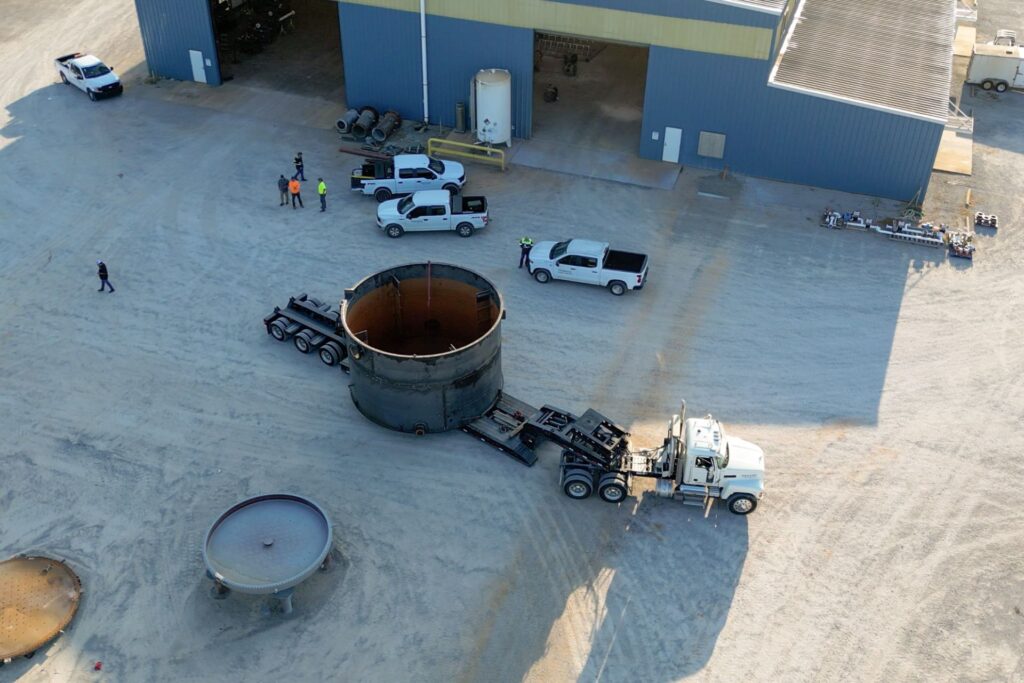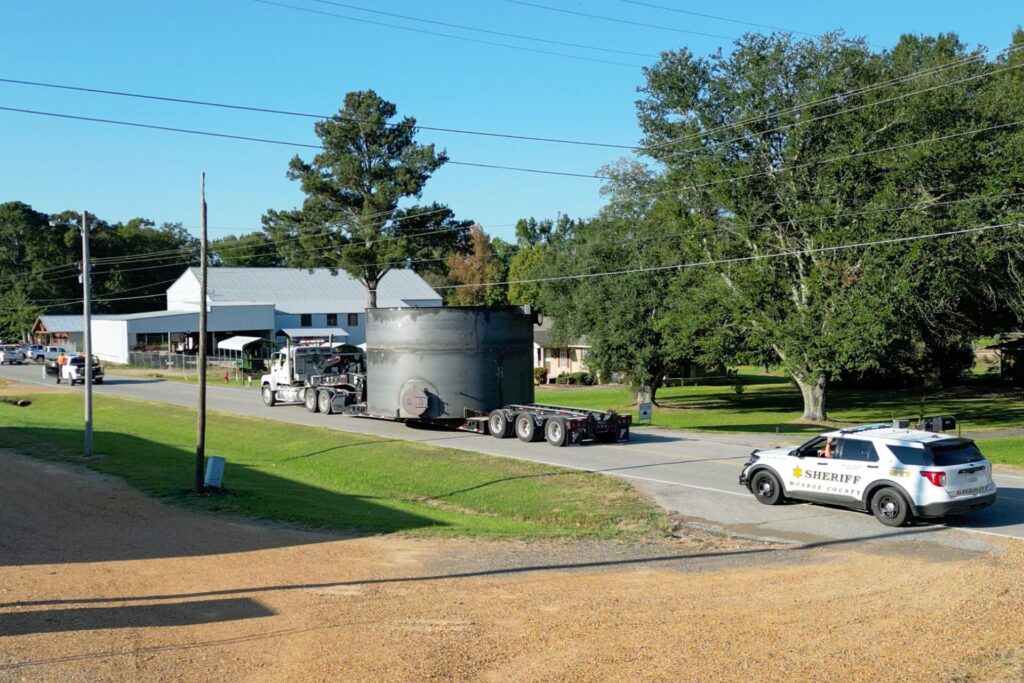Have an oversized or overweight load? Heavy haul trucking services are a necessary solution. Special loads like these present unique challenges that a transport service is designed to handle. With specialized cranes and equipment, along with meticulous planning and execution, heavy haul trucking services can be your peace-of-mind solution. Let’s take a look at what makes up this service.
What is Heavy Haul Trucking?
Simply put, heavy haul trucking is the transportation of loads that outweigh freight carrier standards. Loads that require this service are typically heavy, large, bulky, long, oddly shaped, or all of the above.
Heavy Haul Trucking Equipment
Since they are oversized, these loads often require specialized trailers and equipment to ensure safe and efficient transport.
Trailers
It is important to have specialized equipment that can support the load. Lowboy, flatbed, and extendable trailers can all help distribute weight evenly. They can also help accommodate tall or long loads.

Trailers can help distribute weight evenly and accommodate for tall or long loads.
Other Equipment
To secure the cargo for transport, winches, cranes, and other rigging equipment are typically needed. These tools also come in handy when it’s time to unload.
Heavy Haul Trucking Regulations
To ensure the safety of everyone involved, permits and regulatory framework are required to haul specialized loads.
Regulatory Framework
Heavy transportation services are subject to government rules, or a regulatory framework, to uphold safety standards and reduce impact on the environment. These rules can control certain job aspects such as load dimensions, weight limits, routing restrictions, and equipment specifications for heavy haul trucks.
Permit Requirements
This step is one of the most challenging aspects when it comes to transporting oversized loads. However difficult it may be, you can’t legally transport these loads without necessary permits. Specific requirements for permits can vary, but can be based on anything from load dimensions and weight to travel routes and state regulations.
Pilot Cars
Wide loads typically take up more space on the road than a car. This is where pilot cars and escort vehicles come in. These play a vital role in escorting a specialized load to its final destination, ensuring safety for the transport team and the public. Permits are required for escort vehicles as well, but are typically already covered by oversize and overweight permits.

Escort vehicles play a vital role in guiding a specialized load to its final destination.
Securing the Load
Protocols for load securing play a vital role in preventing accidents, cargo shifts, and road hazards. Imagine the catastrophe that could occur if an oversized load wasn’t properly secured — or maybe it’s best not to imagine.
In order to secure a load properly, operators and riggers must use equipment like chains, binders, straps, and bracing materials to ensure the cargo remains immobilized and that the weight is distributed evenly. These steps also help prevent damage during transport.
Safety and Compliance
Within the specialized arena of heavy haul trucking, a strong emphasis is placed on safety protocols, driver training, and operational certifications.
Vehicle Inspection
As a regular check-in, a thorough inspection is completed of all trucks, trailers, braking systems, and lighting components. This also helps identify and prevent future issues.
Escort Vehicles
As previously mentioned, escort vehicles and pilot cars are essential to ensuring safe transport. These vehicles have their own set of rules and it is important to follow their requirements for proper positioning, communication, and visibility. After all, escort vehicles are responsible for everyone’s safety during the transport — alerting other motorists, managing the flow of traffic, and ultimately guiding the oversized load on its journey.
Driver and Operator Certifications
Driver Training Programs
Companies that provide heavy haul trucking services have training as a priority to keep drivers up to date on safety guidelines and best practices. These programs ensure they have the knowledge, skills, and expertise required to handle oversized loads both safely and efficiently.
Training typically covers topics such as load securing techniques, route planning, regulatory compliance, emergency procedures, and defensive driving strategies specific to heavy haul transportation.
Operator Certifications
While crane operators already have certifications for day-to-day lifts, they often also have certifications for handling oversized cargo. These are important to have as they verify an operators’ technical capabilities, knowledge of safety protocols, and ability to operate complex equipment safely. Obtaining these certifications also help operators contribute to overall compliance standards.
Planning Process
In the dynamic world of heavy haul transportation, meticulous planning serves as the cornerstone of every successful transport job.
Load Assessment and Route Planning
When the planning process begins, step one is an assessment of the oversized load. Factors such as dimensions, weight distribution, structural integrity, and special handling requirements are also considered. At the same time, the route planning process begins. This looks like mapping out the optimal path that accounts for road conditions, infrastructure limitations, clearance heights, and any regulatory restrictions that may impact the transport route.
Permit Acquisition and Regulatory Compliance
Securing necessary permits is a vital part of the planning process. Here at NexGen, we meticulously navigate these requirements, ensuring compliance with state regulations, time restrictions, escort vehicle mandates, and any additional conditions imposed by authorities. All of these factors are important in facilitating a smooth and lawful transport operation.
Equipment and Logistics Coordination
Aligning equipment availability, driver schedules, support personnel, and operational resources are all vital steps to ensure a seamless transport.
Coordination With External Entities
Collaboration with local entities is crucial to maintain a smooth operation. You won’t complete the transport without it. One common example are local law enforcement agencies. Police departments are a vital resource to be in contact with when it comes to traffic management, road closures, and escort services.
Execution Phase
Real-Time Monitoring and Communication
To oversee progress during the transport, real-time monitoring is vital. You may have to address potential challenges, so also be sure a clear communication channel is established with all parties involved.
Response to the Unexpected
In the event of an unexpected roadblock, it’s important to remain agile and respond quickly. Hopefully, the plans you put in place will help your team address these challenges with ease.
NexGen’s Expertise
Here at NexGen, our expertise in heavy haul trucking goes beyond logistics, but embodies a commitment to precision, innovation, and customer satisfaction. And with a focus on quality, safety, and operational excellence, we strive to exceed your expectations in all that we do.

